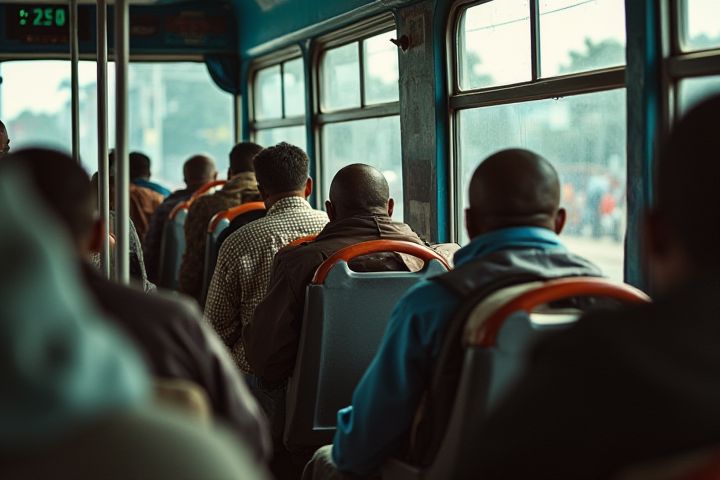
Public transport in Nigeria encompasses various modes including buses, taxis, and motorbikes, tailored to cater to the diverse needs of commuters. The Lagos Bus Rapid Transit (BRT) system is a prominent example, designed to provide efficient and reliable transit services across the bustling metropolis. In addition to BRT, ride-hailing services like Uber and Bolt have gained popularity, offering convenient and flexible travel options for urban dwellers. Overcrowding and traffic congestion remain challenges, especially in major cities; however, initiatives to improve infrastructure and introduce new routes are underway. When utilizing public transport, you can experience the vibrant culture of Nigeria while navigating its urban landscapes.
Lagos BRT System
The Lagos Bus Rapid Transit (BRT) system is a pivotal component of public transport in Nigeria, designed to reduce congestion and enhance commuter efficiency. Operated by the Lagos State Government, it features dedicated bus lanes, high-capacity vehicles, and strategic bus stops to facilitate smooth transit across the city. With routes covering major areas and connecting to other transport modes, the BRT significantly alleviates traffic and provides an affordable alternative for millions of residents. As a result, your daily commutes can become more predictable and time-efficient, contributing to improved urban mobility in Lagos.
Danfo minibuses
Danfo minibuses are a primary mode of public transport in Nigeria, especially in urban areas like Lagos. These iconic yellow vehicles provide an affordable means of commuting for millions, often overcrowded yet crucial for daily transit. Operating on specific routes, Danfos are known for their distinct style, featuring a sliding door and often vibrant artwork. While they contribute significantly to the local economy, challenges such as traffic congestion and regulatory issues persist, impacting their overall efficiency.
Traffic congestion issues
Nigeria's public transport system faces significant challenges related to traffic congestion, particularly in urban areas like Lagos and Abuja, where the rapid population growth exacerbates the problem. The lack of efficient infrastructure, such as dedicated bus lanes and reliable mass transit options, leads to increased travel times and air pollution. Investment in modern public transit solutions, including Bus Rapid Transit (BRT) systems and rail networks, can alleviate congestion and enhance mobility for commuters. Emphasizing the importance of public transport can lead to a more sustainable urban environment and improve overall quality of life for residents.
Nigerian Railway Corporation
The Nigerian Railway Corporation (NRC) plays a vital role in the public transport sector, significantly enhancing connectivity across the nation's diverse regions. Operating an extensive network of rail services, the NRC facilitates the movement of passengers and freight, contributing to economic growth and reducing road congestion. Recent initiatives, such as the modernization of tracks and the introduction of new locomotive technology, aim to improve safety and efficiency in rail travel. By investing in infrastructure and expanding routes, the NRC strives to promote sustainable urban development and boost tourism in Nigeria.
Abuja Light Rail
The Abuja Light Rail is a pivotal development in Nigeria's public transport system, enhancing connectivity within the Federal Capital Territory. This modern rail network operates seamlessly, integrating various neighborhoods and significantly reducing travel time for commuters. With a total length of approximately 45 kilometers, the Light Rail features multiple stations strategically located to serve key areas, including government buildings, commercial centers, and residential zones. By opting for this efficient mode of transportation, you contribute to alleviating road congestion and promoting sustainable urban mobility in Abuja.
Okada motorcycle taxis
Public transport in Nigeria has increasingly centered on Okada motorcycle taxis, which are a popular and affordable mode of transportation in urban areas. These motorcycles provide quick access to congested city streets, allowing commuters to navigate traffic more efficiently. The rise of ride-hailing apps has further boosted the Okada sector, enabling users to book rides with ease through their smartphones. However, safety concerns and regulatory challenges persist, prompting ongoing discussions about the future of this vital transportation option.
Ride-hailing apps
Public transport in Nigeria is increasingly influenced by ride-hailing apps like Uber, Bolt, and Lyft, which have transformed urban mobility and provided alternative transit options. These platforms offer users convenient access to private transportation through mobile applications, significantly reducing wait times and enhancing travel experiences. The integration of ride-hailing services has also prompted traditional taxi services to adapt and innovate, ensuring competitive pricing and better customer service. As urbanization continues to rise in Nigerian cities, the reliance on ride-hailing apps is expected to reshape the future of public transport, offering a flexible and efficient means of transportation.
Interstate bus services
Interstate bus services in Nigeria form a crucial component of the country's transportation infrastructure, connecting major cities and regions. With various operators like ABC Transport and GIGM, these services offer affordable and accessible travel options for millions of passengers. Buses are equipped with amenities such as air conditioning, comfortable seating, and onboard refreshments, ensuring a pleasant journey. By utilizing these interstate bus services, you can efficiently navigate Nigeria's expansive landscape while experiencing the diverse culture that each region has to offer.
Lack of infrastructure
The public transport system in Nigeria faces significant challenges due to inadequate infrastructure, impacting the efficiency of urban mobility. Many cities struggle with poorly maintained roads and insufficient transport facilities, leading to traffic congestion and delays for commuters. Additionally, the lack of designated bus lanes and reliable scheduling compounds the difficulties in accessing timely and safe transportation. Addressing these infrastructure deficits is crucial for improving public transport services and enhancing the overall quality of life for residents.
Safety and regulation concerns
Public transport in Nigeria faces significant safety and regulatory challenges that impact daily commuters. With a high incidence of road accidents, measures are being implemented to enhance vehicle maintenance and driver training, ensuring the well-being of passengers. Regulatory bodies are increasingly focused on enforcing compliance with safety standards, which includes vehicle inspections and the supervision of commercial drivers. By prioritizing safety and effective regulation, Nigeria aims to improve the overall reliability and security of its public transport system, ultimately benefiting your commute.
